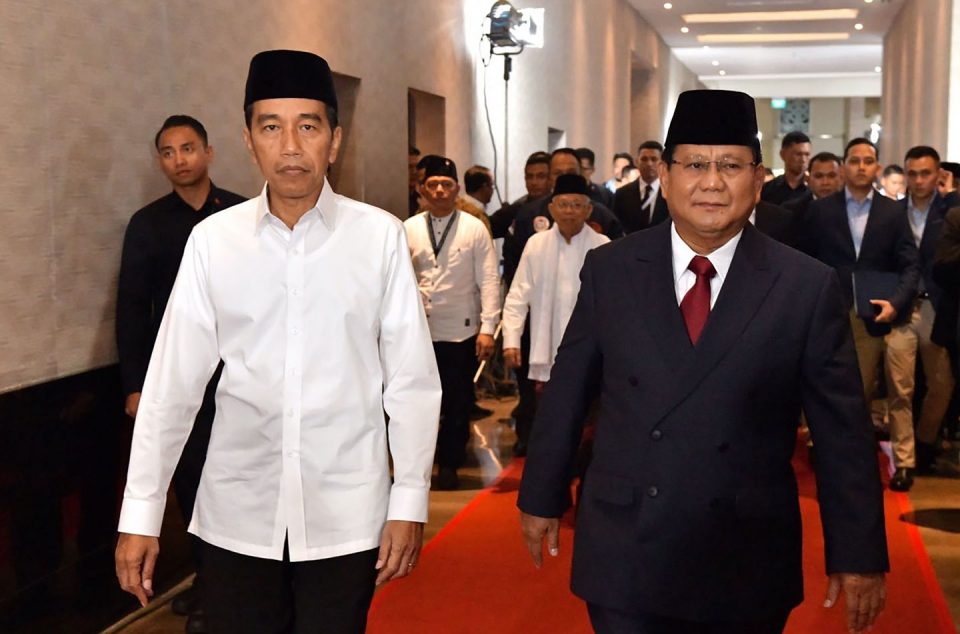It might have surprised many of Indonesia’s foreign residents, but newly reelected President Joko Widodo has just appointed his former opponent for the presidency, Prabowo Subianto, as Defence Minister in the new Onward Cabinet that as been put together.
In a move that could appear almost impossible to understand from a foreigner’s perspective – his decision has raised eyebrows at home also – unlikely alliances are nevertheless more of a common occurrence in the game of political chess in Indonesia.
Even though Prabowo, a former army general, may be particularly qualified to take such a position in the government, his role as Jokowi’s harsh opponent during the 2014 and 2019 elections can’t be forgotten just like that. His criticism of his former rival over the past five years have been unforgiving and uninterrupted, and it’s fairly difficult to comprehend how he will suddenly switch from opposition to government and abide by the president’s directives and leadership.
To justify his unanticipated choice, which is undoubtedly dictated by party-political tactics, president Jokowi has called upon the typical Indonesian notion of “gotong royong.” Two magic words, that translate into the idea of “working together for the common good.” This is a typical Indonesian concept, rooted in the Republic’s ideals, and furthermore deemed absolutely necessary to cement together this very diverse country.
Gotong royong is a cultural trait of the nation: understandable by any citizen.
Jokowi further told the press at the State Palace that he chose to include Prabowo in his Cabinet because the concept of opposition did not exist in Indonesia’s democracy. If his decision to appoint Prabowo has met criticism locally, this is not because he gave a hand to his challenger but because of Prabowo’s poor record on human rights. Prabowo was allegedly involved in the disappearance of activists during the fall of former strongman Suharto in 1998.
He has also been repeatedly accused of other human rights abuses, including during the army’s operations in East Timor in the 1970s. Consequently, human rights activists, as well as survivors and families of victims of past violations, have demanded Jokowi revoke Prabowo’s appointment. It should be noted that Prabowo failed to visit the United States to attend his son’s university graduation in 2000 after he was denied entry by the US State Department.
True, opposition does not exist in Indonesia. There is an unambiguous reason for this; opposition was thoroughly slaughtered in 1965-66 after the “crawling” coup of General Suharto, in which an estimated 1 – 2 million leftists or assimilated sympathisers were killed and dumped in mass graves. Since then, the Indonesian political spectrum, originally ranging from right to left, has been considerably narrowed.
The political game in this democratic era has not sprung a new dimension, and still reflects the legacy of this dark epoch. More than fifty years after the tragedy, socialist or leftist ways of doing politics are still taboo in Indonesia. The voters’ choice now ranges between nationalist and religious parties. Nationalists are also religious, of course, and the religious cannot avoid obedience before the principles of the nation. In the end, the debate on social matters has been mostly dodged or poorly resolved by inadequate programs in the last 50 years.
The Indonesian illusion here is the belief that state or religious diktats will be enough to fulfil these needs. Because discussions on social issues are taboo, at least from a Marxist analytical understanding, fundamental aspects of doing politics for the benefit of the people are not understood in Indonesia. The point is not to promote communism’s return but to assert that answers to social distress cannot be addressed without a thorough knowledge of historical leftist movements and culture, and further because they are historically at the core of modern democracy. Without the left, there is no democracy; there is no rule of the people, etymologically.
Local political games don’t help, either. What seems to matter the most to politicians here is not the welfare of Indonesian citizens, but their own vested interests. Turn on your TV and you’ll see all of them playing party politics, shamelessly, at any time on the news channels. When do they discuss, with sincerity, the plight of the poor? Where are the proposals for social solutions to alleviate the destitute? Who is advocating educational systems to improve the skills of the nation? Count the times and compare it to all the times they spend explaining their strategy to stay in power before an array of microphones.
Another criterion is also at play when it comes to denying the democratic concept of majority and opposition. And this one is typical of Indonesian psyche; it’s the constant avoidance of conflicts. However, the political challenges in democracy need more than a mild discussion on divisive topics, for the sake of nation’s unity. Sometimes, you have to choose where you stand. Does Prabowo really stand beside Jokowi? Do they share the same values? Is it really for the good of the country, like Jokowi said in justifying his pick? We are free to doubt it, no matter his arguments.
In the end, it is sad to see President Jokowi, a true man of the people, having to compromise over and over again just to be able to do the job he was two times elected to do: ruling the country. The man himself has a true understanding of social matters and always puts forward his simple folk style, putting himself at the people’s service. But to keep a majority in parliament he had to choose a certain running partner and had to please his political patrons all the way through to the shape of the cabinet.
Now, we discover in awe, that he even has to please his opponents. Gotong royong or not, is this really the kind of democracy Indonesia needs? Or has Indonesian democracy been taken hostage to an unprecedented level by political parties? Rough waters ahead is the bet, but time will tell with the unfolding of this rather worrying new chapter in Indonesian politics….




